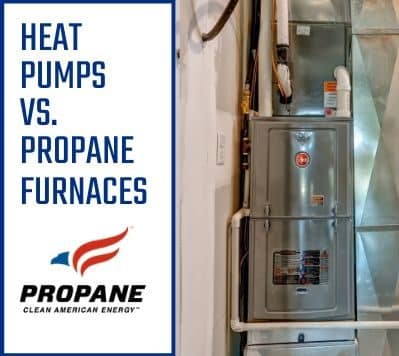Heat Pumps vs. Propane Furnaces
There are several options for home heating. To understand which system is best for your home, it’s important to look at a variety of factors. Important considerations include performance, efficiency, cost and comfort. In this article, we’ll take a closer look at ground source heat pumps (GSHP’s) and high-efficiency propane furnaces and provide you with facts and information you can use to make the best choice for your home.
First, let’s take a look at the energy source. High-efficiency propane furnaces use propane as the primary source of energy. A small amount of electric energy is used for the blower. In addition, propane furnaces use the thermal energy released by propane combustion to deliver hot air to the home for optimal performance and does not require a backup system. Ground source heat pumps use more electricity. They use the ground’s ability to act as a heat source with electricity powering pumps, compressors and fans. While GSHP’s do often have high-efficiency ratings, they also consume more standard power from power plants.
The Efficiency of Propane Furnaces Compared to Ground Source Heat Pumps
Annual Fuel Utilization Efficiency (AFUE) is the measurement of a furnace’s efficiency in converting fuel to heat energy. The higher the AFUE rating, the more efficient the unit is. High-efficiency propane furnaces are available with AFUE efficiency levels up to 98%. The efficiency of ground source heat pumps is measured through Coefficient of Performance (COP). COP represents the ratio of total heating capacity to the unit’s electrical energy input.
AFUE ratings account for fuel consumption directly related to space heating. However, they do not account for the electrical use of the blower motor. COP measures efficiency but does not reflect the performance of the entire GSHP system, since it excludes the energy required to pump the ground loop and blower motor. In Missouri, the Energy Star program certifies propane furnaces with a 95% AFUE or higher. GSHP’s are required to have a COP greater than 3.6 to earn the Energy Star label.
The Cost of a Propane Furnace vs. Ground Source Heat Pump System
The first cost, the cost for equipment and installation, is much less with a propane furnace compared to a ground source heat pump. First costs for a high-efficiency propane furnace average around $12,700 while the first cost of a GSHP system is much higher, averaging around $31,700.
High-efficiency propane furnaces are common in the market and are also straightforward to size and install, resulting in a reasonable first cost. The first cost of a GSHP closed-loop system is significantly higher, driven by the added costs of drilling, pumps, tubing and other materials needed.
High-efficiency systems like propane furnaces and ground source heat pumps can qualify for a variety of federal, state and local incentives. Even with significant tax credits for GSHP systems, the first costs are still high. In addition, the payback period, how long it will take to pay back the first costs of a heating system through reduced energy costs, are lengthy and can range from 16-36 years, often longer than a homeowner lives in a home.
In fact, MOPERC has rebates available for first-time installations of propane furnaces. However, even… Inserted into previous paragraph originally
The Comfort of a Home with a Propane Furnace Compared to a Ground Source Heat Pump
High-efficiency propane furnaces supply temperatures from the register between 120-140 degrees Fahrenheit. These temperatures are much more comfortable than the air delivered by ground source heat pumps that range between 90-120 degrees, which can be lower than the average person’s body temperature. High-efficiency propane furnaces heat homes steadily and comfortably, with a warmer heat where you’ll be able to feel the difference.
High-efficiency propane furnaces offer many advantages over ground source heat pumps, or GSHP’s. If you’re interested in building a new home or replacing the heating system in your current home, visit with your local propane supplier.
Your professional propane dealer can:
- help you determine if a high-efficiency propane furnace is right for your home,
- work with you to determine your eligibility for rebates and help you with the application process,
- assist you from the beginning of your project to its completion.
Source: https://propane.com/resource-catalog/resources/gshp-comparison-guide/
